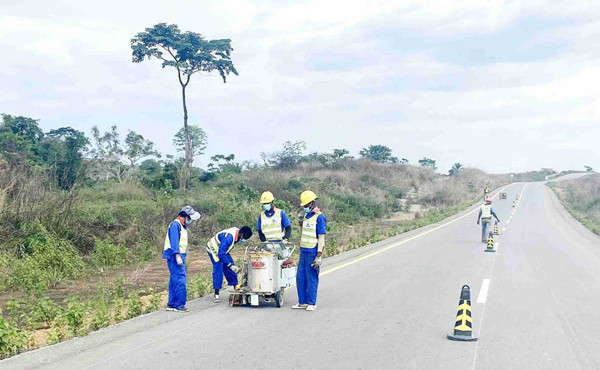Chinese Builders Abroad Contributing to Belt & Road

Chinese and Angolan employees of China Railway No 4 Engineering Group Co Ltd (CREC4) paint lines on the Quitexe-Ambuila Highway in Angola's Uige province in March, which was built by the Chinese State-owned enterprise. [ZHANG JIAQIAN/FOR CHINA DAILY]
Providing quality projects outside China earns praise, boosts shared interests
Costa Rican President Carlos Alvarado Quesada attended a ceremony on March 24 at which an urban water supply plant built by China Railway No 4 Engineering Group Co Ltd, known as CREC4, was handed over to Costa Rican operators.
Construction on the plant, which is the third project aided by China in Costa Rica, started in April 2019. It is helping residents in Canas access sufficient water and, in Bebedero, eliminating excessive arsenic in the drinking water.
"Its advanced equipment and technology help deliver high-quality water, boosting local commercial and production development," said Francisco Alberto Mendoza Mata, a technical expert at the Costa Rican Institute of Aqueducts and Sewers, which administers the nation's water systems.
The project is another example of the success of the Belt and Road Initiative, which was proposed in late 2013. It has boosted the work that Chinese companies had been doing for years overseas.
One company heavily involved in those efforts is State-owned Chinese railway company CREC4, created in 1950 and now employing over 23,000. It is a unit of the centrally administered China Railway Group Ltd-a Fortune Global 500 company.
Moving beyond railroads
CREC4, which has 18 wholly owned affiliates, 10 branch companies, 41 operating branches, 10 regional operation headquarters, numerous other subordinate units and eight overseas operating offices, has gone beyond its main businesses of railway and highway construction and now is involved in building housing, municipal public works and water conservancy projects.
It has done work in nearly 20 countries, including Angola, Ethiopia, Mongolia, Indonesia and Bangladesh, in addition to its mammoth domestic operations.
"Although working overseas is very hard, the implementation of the BRI and the development of our enterprises require us to make contributions," said Zhai Guangyang, chief of the Materials Department at CREC4 Municipal Engineering Co Ltd's Angola Regional Project Department.
Zhai said his work abroad has been challenging. After traveling to Angola in 2013, he stayed busy purchasing local materials as well as managing equipment and local employees.
As chief of the department, he had to leave for work early and return late every day as he hunted for high-quality materials for different projects in Angola.
Bumpy dirt roads and the hot climate took a toll. He had to work late at night to handle documents for transporting materials and for local Customs officials.
"For seven years, I had to wait until 1 am in Angola to say good morning to my wife and child when they woke up in China due to a time difference of seven hours."
In April 2019, a video broadcast on China Central Television showed a Chinese man driving a bulldozer to clear hidden landmines in Angola. It went viral among the local Chinese community.
The man was Lyu Honggang, Communist Party of China secretary at the Angola Project Management Department of CREC4 First Engineering Co Ltd, who said he had to act boldly to solve the problem.
The Angolan Civil War, which started in 1975 and continued off and on until 2002, left numerous landmines around the country, posing a huge problem during construction.
"That morning, I learned that a landmine had exploded at our temporary facilities construction site in Kwanza Norte province, halting all work. Nobody wanted to get back to work until they knew the danger had been cleared."
"So I drove a bulldozer to clear the hidden landmines. After more than two hours, when other construction workers saw there no longer was any danger on the worksite, they began to follow me, leading to a smooth resumption of work," he said.
Twelve CREC4 projects are ongoing in Angola, covering housing, municipal projects, bridges and highways, and water plants.
In 2016, CREC4 sent Chen Hong to Mongolia to supervise projects there. Chen had begun his career in 2006 at CREC4 First Engineering, which sent him to Nepal to work on a hospital project.
He went to Oman in 2010 to serve as chief engineer on a project. From 2014 to 2016, he was in Africa, working in Sudan, Mauritania and Ethiopia.
Over 15 years, he has worked on some 10 projects in six countries, becoming a model and pioneer for CREC4's international project managers, given his extensive overseas management experience and good command of foreign languages.



